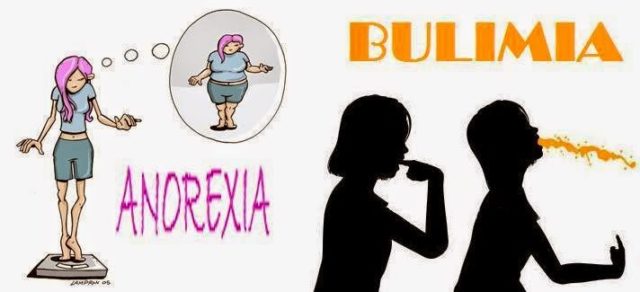
Anorexia and bulimia are eating disorders. The most serious eating disorder is anorexia nervosa, which is characterized by dangerously low body weight.
Bulimia nervosa is not as frequently fatal, but it seriously affects the well-being of the sick and can have serious medical complications. Bulimia is about two to three times more common than anorexia nervosa, and 90% of people with the condition are women. It usually develops around the age of 20.
The most common behavior that will lead to an eating disorder such as Anorexia and Bulimia is dieting.
Anorexia Nervosa

Anorexia nervosa is a serious mental health condition in which people see them as overweight even though they are dangerously thin.
About half of those with anorexia nervosa achieve this weight loss with diets and avoiding food among others.
Another key feature of anorexia nervosa is that it includes an intense and irrational fear of body fat and weight gain.
Many people with anorexia also have coexisting psychiatric and physical illnesses, including depression, anxiety, obsessive behavior, substance abuse, cardiovascular or neurological complications, and impairment of physical development.
Symptoms of Anorexia
- Skipping meals or making excuses for not eating.
- Make your meals instead of eating what the family eats.
- Persistent worry or complain about being fat and talk about losing weight.
- Frequently look in the mirror for perceived defects.
Other physical symptoms may develop over time:
- Loss of calcium from the bones.
- Dizziness.
- Brittle hair and nails.
- Dry and yellowish skin.
- Growth of fine hair on the body.
Psychological Factors
Many people who develop anorexia share certain personality and behavior traits that can make them more likely to develop the condition:
A tendency towards depression and anxiety It’s hard for them to handle stress Perfectionism -set strict and demanding goals or standards Having feelings of obsession and compulsion, but not necessarily obsessive-compulsive disorder Low self-esteem.
Anorexia often begins as a form of diet that gradually gets out of control.
It is also believed that the risk of someone developing anorexia is higher in people with a family history.
Anorexia Treatment
Treatment for anorexia nervosa usually involves a combination of psychological therapy and supervised weight gain.
Cognitive Behavioral Therapy
A well established, highly effective and lasting treatment is cognitive behavioral therapy, which focuses on identifying, understanding and changing patterns of thinking and behavior. The benefits are usually seen in 12 to 16 weeks, depending on the person.
Family Interventions
Anorexia not only affects an individual – it can have a great impact on the whole family. Family intervention is an important part of treatment for young people with anorexia.
Family intervention should focus on eating disorders, and implies that the family discusses how anorexia has affected them. It can also help the family understand the condition and how they can help.
Self Help After
After visiting your doctor, you will find it helpful to join a self-help group in which other people share problems similar to yours, these groups can provide both information and support in difficult times that all those who suffer from a disorder of the Food usually go through.
Bulimia Nervosa

This condition usually affects an age group slightly higher than that for anorexic patients, often women with just over 20 years who have also had an overweight problem in childhood.
As with anorexics, patients with bulimia suffer from an exaggerated fear of being fat.
Unlike anorexics, bulimics generally manage to keep their weight within normal limits. This is because, although they try to lose weight by causing vomiting or taking laxatives, binge eating also occurs.
This binge-eating involves eating, in a short period, large amounts of fattening foods that are usually not allowed.
For example, they can eat several packages of cookies in a row, several boxes of chocolates and several cakes in a couple of hours or even in less time.

Later you will feel sick, very guilty and depressed. Binge eating or vomiting can cause your weight to rise or fall above 3 kilos in a very short period.
It can be associated with:
- Low self-esteem.
- Alcohol abuse.
- Depression.
What Are The Signs Of Bulimia?
– Worrying more and more about your weight.
– Binge eating a lot of food in a short period.
– Vomiting and/or using laxatives or other ways to get rid of calories.
- Have irregular menstrual periods.
- Feeling tired Feel guilty.
Causes of Bulimia
Our culture has an incessant idealization that thinness and “perfect” body is synonymous with beauty and success.
In the case of bulimia nervosa in particular, the physiological effects of dietary restriction can trigger binge eating.
Also, feelings of inadequacy, depression, anxiety, and loneliness, as well as problematic family and personal relationships, can contribute to the development of eating disorders.
In some people, anorexia and bulimia seem to have been triggered by some unpleasant events (such as the breakdown of a romantic relationship).
Treatment of the Bulimia
You can recover from bulimia, but it can be a long and difficult process.
Cognitive Behavioral Therapy
Cognitive-behavioral therapy (CBT) is the most common type of psychological treatment for bulimia. It involves talking with a therapist and looking at their emotions in detail to find new ways of thinking about situations, feelings, and food.


